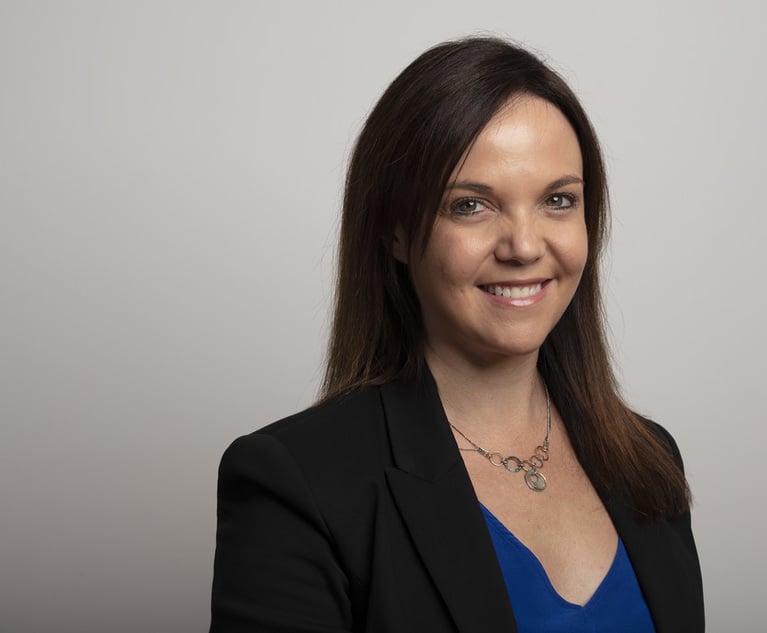Small Law Firms at Big Risk in Italy
The country's many one-lawyer operations and small firms will have to adapt if they want to make it through the impending economic downturn, local lawyers say.
April 03, 2020 at 05:01 AM
6 minute read
 Pedestrians wear protective face masks as they walk near Duomo cathedral in Milan, Italy, on Monday, Feb. 24, 2020. Photographer: Francesca Volpi/Bloomberg
Pedestrians wear protective face masks as they walk near Duomo cathedral in Milan, Italy, on Monday, Feb. 24, 2020. Photographer: Francesca Volpi/Bloomberg
Not only has Italy been one of the nations worst affected by COVID-19, a section of its legal market appears particularly vulnerable to the seismic economic shocks that look set to follow.
Sole practitioners and small law firms, of which Italy has plenty, face the tough task of working remotely and staying afloat during the quiet period, according to various local lawyers.
"It's something peculiar in the Italian market", says one Milan-based corporate partner at an international firm, "that many firms are made up of only one-to-three lawyers".
"There's plenty of smaller firms, professionals who still practice like it was years ago. This shows Italian lawyers do not change very easily, but maybe this will change their approach."
The social and economic upheaval facing the country is immense. As of March 31, Italy had more coronavirus-related deaths than any other county, having seen 12,428 deaths, almost half of all deaths in Europe, according to Statista.
The partner adds that "one man show" operations and smaller firms in Italy do not necessarily have the financial structures to remain financially secure and could experience "major problems".
"Italy is very traditional as a market", the person continues. "Lawyers in Milan are changing, but if the rest of Italy doesn't adapt quickly, they won't survive".
"I'm not sure how sophisticated they are and whether they are able to adapt to this new world where we're forced to work remotely"
The view is echoed by a private equity partner at one of the country's best-regarded firms, who estimates that close to 50% of the Italian legal market is made up of individual practitioners or small firms. They say these firms will be impacted largely due to the fact that court activity is suspended, so the "usual stream of revenue is capped off".
"I'm not sure how sophisticated they are and whether they are able to adapt to this new world where we're forced to work remotely", they explain. "They're struggling to survive but also can't do much else if litigation is paused."
The private equity partner adds that boutiques will probably survive but will be "struggling", and that they could see an exodus of talent should they freeze associate salaries, which is happening across developed markets.
"If you're big, you have big shoulders and can navigate better in crises"
"Firms are discussing this", the partner says. "One possibility is laying off associates and staff, but most firms are more likely to consider freezing at least the increase of salaries."
"If you're big, you have big shoulders and can navigate better in crises", the partner continues. "As always, crises push you to think about your model and whether the model is the best possible one in terms of efficiency."
Tech 'a big differentiator'
Size is not the only concern. A lawyer in an Italian legal arm of a Big Four firm also sees smaller firms that are not technology-literate, putting them at risk of being impacted negatively, particularly as digitalisation and e-commerce continues to boom.
Describing the current situation as "strange days", the lawyer explains that technological ability "could be a big differentiator" as it is the key to ensuring business continuity. "These new ways to work are here to stay", they add, "they will be the new normal".
"Bigger firms are usually more tech-friendly than smaller firms, notably outside big cities. Clearly, this is not just an Italian situation. The key here is the ability of those in charge to adapt quickly to new needs. The evolution theory is nothing new. Bottom line, as Darwin used to say, it is the most adaptable species that survives."
The need for adapting to a new scenario also applies to larger firms, which partners admitted would also be badly affected by the crisis.
"We still have things to do but we do not receive many emails every day. I don't"
The partner at the elite firm says the firm's billable hours are down by around 30%, while another partner adds that although their billing hasn't vastly been affected yet, it "certainly will be".
"We still have things to do but we do not receive many emails every day. I don't", they add, also stating that they expect to see firms make redundancies.
A financial services partner at another domestic firm suggests that big law firms with a corporate and M&A focus will be seeing a lot of difficulty. A real estate partner at a large international firm predicts there won't be a significant recovery until 2021.
The Big Four lawyer does think that bigger firms may suffer "due to the contraction of the capital markets and financial activity". Yet, the lawyer does not think the larger firms are likely to shut down. They pointed to their time as a lawyer during the 2008 financial crisis, where they found they benefited with an influx of work.
"Firms didn't close then and they won't close now", they added. "Whatever happens, there is always a need for lawyers unfortunately".
The partner at the elite firm echoes this, stating "there will always be things to do in the firm – we'll survive, of course". They add that although the work now may be small, when you "put together many small things, in the end it can be great amounts".
Some expect a 'V'-shaped crisis, where you shoot back up as fast as you went down. But they are also conscious of the virus returning if things return to normal too quickly. One partner says: "Everybody could come back to work in May, but then there could be a bounceback of the virus in, say, September."
"Depending on the magnitude of the bounceback, we may again be in trouble".
Read More:
Stay Flexible and Get Your Sleep: Life in Lockdown for a Working Parent in France
Slaughters, Linklaters Halt Associate Recruitment Amid Pandemic Disruption
NOT FOR REPRINT
© 2025 ALM Global, LLC, All Rights Reserved. Request academic re-use from www.copyright.com. All other uses, submit a request to [email protected]. For more information visit Asset & Logo Licensing.
You Might Like
View All
Goodwin's Singapore Private Equity Partner Leaves to Join Key Client Hillhouse Investment


Trending Stories
- 1Decision of the Day: Judge Dismisses Defamation Suit by New York Philharmonic Oboist Accused of Sexual Misconduct
- 2California Court Denies Apple's Motion to Strike Allegations in Gender Bias Class Action
- 3US DOJ Threatens to Prosecute Local Officials Who Don't Aid Immigration Enforcement
- 4Kirkland Is Entering a New Market. Will Its Rates Get a Warm Welcome?
- 5African Law Firm Investigated Over ‘AI-Generated’ Case References
Who Got The Work
J. Brugh Lower of Gibbons has entered an appearance for industrial equipment supplier Devco Corporation in a pending trademark infringement lawsuit. The suit, accusing the defendant of selling knock-off Graco products, was filed Dec. 18 in New Jersey District Court by Rivkin Radler on behalf of Graco Inc. and Graco Minnesota. The case, assigned to U.S. District Judge Zahid N. Quraishi, is 3:24-cv-11294, Graco Inc. et al v. Devco Corporation.
Who Got The Work
Rebecca Maller-Stein and Kent A. Yalowitz of Arnold & Porter Kaye Scholer have entered their appearances for Hanaco Venture Capital and its executives, Lior Prosor and David Frankel, in a pending securities lawsuit. The action, filed on Dec. 24 in New York Southern District Court by Zell, Aron & Co. on behalf of Goldeneye Advisors, accuses the defendants of negligently and fraudulently managing the plaintiff's $1 million investment. The case, assigned to U.S. District Judge Vernon S. Broderick, is 1:24-cv-09918, Goldeneye Advisors, LLC v. Hanaco Venture Capital, Ltd. et al.
Who Got The Work
Attorneys from A&O Shearman has stepped in as defense counsel for Toronto-Dominion Bank and other defendants in a pending securities class action. The suit, filed Dec. 11 in New York Southern District Court by Bleichmar Fonti & Auld, accuses the defendants of concealing the bank's 'pervasive' deficiencies in regards to its compliance with the Bank Secrecy Act and the quality of its anti-money laundering controls. The case, assigned to U.S. District Judge Arun Subramanian, is 1:24-cv-09445, Gonzalez v. The Toronto-Dominion Bank et al.
Who Got The Work
Crown Castle International, a Pennsylvania company providing shared communications infrastructure, has turned to Luke D. Wolf of Gordon Rees Scully Mansukhani to fend off a pending breach-of-contract lawsuit. The court action, filed Nov. 25 in Michigan Eastern District Court by Hooper Hathaway PC on behalf of The Town Residences LLC, accuses Crown Castle of failing to transfer approximately $30,000 in utility payments from T-Mobile in breach of a roof-top lease and assignment agreement. The case, assigned to U.S. District Judge Susan K. Declercq, is 2:24-cv-13131, The Town Residences LLC v. T-Mobile US, Inc. et al.
Who Got The Work
Wilfred P. Coronato and Daniel M. Schwartz of McCarter & English have stepped in as defense counsel to Electrolux Home Products Inc. in a pending product liability lawsuit. The court action, filed Nov. 26 in New York Eastern District Court by Poulos Lopiccolo PC and Nagel Rice LLP on behalf of David Stern, alleges that the defendant's refrigerators’ drawers and shelving repeatedly break and fall apart within months after purchase. The case, assigned to U.S. District Judge Joan M. Azrack, is 2:24-cv-08204, Stern v. Electrolux Home Products, Inc.
Featured Firms
Law Offices of Gary Martin Hays & Associates, P.C.
(470) 294-1674
Law Offices of Mark E. Salomone
(857) 444-6468
Smith & Hassler
(713) 739-1250









